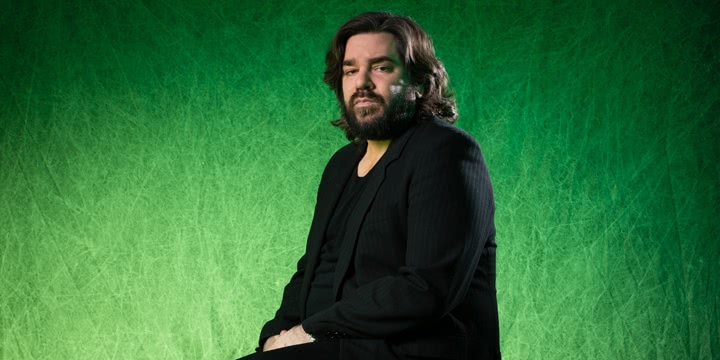If you know of Matt Berry, chances are it’s due to his screen appearances rather than his music: Berry captured the attention of contemporary comedy lovers with his role as rogue zoo owner Dixon Bainbridge inThe MightyBooshand incorrigible pants man Douglas Reynholm inTheIT Crowd.
Nonetheless, if you rifle through his back catalogue it’s equally crammed with kookily satisfying gems, off-kilter works like Snuff Box, a super dark comedy about a gentleman’s club for hangmen,and Gareth Marenghi’s Darkplace, a supernatural hospital drama set in the ’70s.
More recently Berry has written and acted in his own TV baby Toast of London, a stonkingly funny comedy revolving around his oddly loveable character Stephen Toast. While Toast is a top-shelf lothario and an actor of dubious skill in deep denial about his place in the pecking order, his consistent failures make us feel for him, and the series puts to use Berry’s trademark comedy tools: a mane of hair luxuriant enough to make other blokes his age cry and his sonorous boom of a voice. Toast also boasts a killer intro track, which brings us nicely to Berry’s lesser-known but equally prodigious talent: the tune, ‘Take My Hand’, was written by him.
No actor-turned-singer, Berry stumbled into comedy accidentally, while straying away from his artistic roots were in fine arts – specifically painting – and music. Over the years Berry has scored plenty of the shows on which he’s worked (check out ‘Theme from Snuff Box’) and even provided a multitude of soundtracks for shows he hasn’t appeared in, including Steve Coogan’s Saxondale. If that’s not enough, he also has five studio albums under his belt, including a compilation of music for insomniacs – no joke: Berry is a notorious night owl – with his sixth, The Small Hours, out now.
Berry is a self-confessed stickler for detail when it comes to Toast. Does the same apply when it comes to his music? “I think so, pretty much,” he says. “If you’ve come up with something and it’s referencing things that you have a clear idea of, well it’s the same in any art form. If it’s authored by you, you have to be all over it.” Indeed, The Small Hours clearly demonstrates that love for minutiae and the extra efforts to which he’ll go in order to get things sounding just-so: for instance, some of the recording was done on a Decca desk from the 1950s, a piece of machinery that emitted a burning-electrical pong when he turned it on.
Additionally, the fact that The Small Hours has been released on the Acid Jazz label gives you some insight into the sound of the record. Like a lot of Berry’s musical work, there’s snatches of, um, acid jazz, but the work also pays homage to ’60s and ’70s prog, folk and psychedelia. A lot of the album sounds sunny, albeit bleached through a retro filter – though the notable exception to that particular rule is ‘Night Terrors’, an instrumental in the vein of a ’70s Italian-horror soundtrack.
Contrast that with the lyrics: every track smacks of existential crises. On ‘One By One’, Berry sings about seeing his “whole life sailing by alone” and hair loss, while ‘The Peach And The Melon’ talks about a man who is “more than I’ll ever be”. Even more cutting is the single ‘Gone for Good’, one that refers explicitly to the hideous shit we say to ourselves, in this case including the epithets “weak” and “coward”.
Was Berry having a bad year? “Not at all,” he demurs. “The last album I made was in 2013, so it’s basically a collection of songs written since then. There’s quite a long time between then and now. There’s no point in marking alright things or things that have gone well. I’m not really interested in conveying that. If I’m going to write personal songs – bits of it are personal and other bits are surreal – it’s that kind of energy that I’m more interested in than a happy song. I don’t think they’re miserable though – I think they’re kind of bitter sweet.”
On Berry’s website, he tells an ominous tale about the inspiration for the title song on his previous album, Kill The Wolf a story that involved a “lady friend” zoning out and telling him to split before the sun rises, later denying any knowledge.
This time around there was no pseudo-mystical inspiration for The Small Hours – the work is more a reflection on the cost of Berry’s comedic fame. “On The Small Hours I’m sort of commenting on the other side of what I do: the public side I guess. It’s about the comedy – what being on the TV entails and the knock-on effects of being a relatively known face. I can’t escape that: it becomes part of who you are. You try to avoid mixing the two, but they’ve always gone hand in hand in some way.
“I mean, I do try to separate [the TV work] and the music. They’re not really linked – they’re just two things I do and there’s no artistic link as such, but the paths cross. Lyrically, [the fame] infuses the music and you end up commenting on the darker sides of what being on the TV can bring, and all of the darker people that show up once you’re on TV.
“That is interesting. That’s a far more interesting basis for a song than say, ‘I’ve had a good day’. Who cares about that? It’s much more interesting if you spot something odd in your day.”
Matt Berry’sThe Small Hours isout now through Mushroom.

































